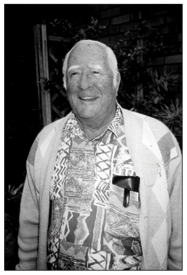Services on Demand
Article
Indicators
Related links
-
 Cited by Google
Cited by Google -
 Similars in Google
Similars in Google
Share
SAMJ: South African Medical Journal
On-line version ISSN 2078-5135
Print version ISSN 0256-9574
SAMJ, S. Afr. med. j. vol.100 n.1 Pretoria Jan. 2010
SAMJ FORUM
IN MEMORIAM
Barry Mervyn Stacey (1923 - 2009)
Roy O Wise

Dr Barry Stacey died on 21 October after a long illness. Born in Durban on 14 September 1923, he was a true Durbanite. Supported by his elder brother he was educated at Michael House but left after Standard 9 to help with his father's farm in Lidgetton. He had always wanted to be a doctor and was encouraged to do so by my surgical mentor LV Pearson, who owned an adjacent farm. This was interrupted by the outbreak of World War II. At first too young to enlist, Barry joined the navy as soon as he was 17. His father had sailed before the mast and a great-great grandfather had served under Lord Nelson at the battle of Copenhagen. As a schoolboy he was inspired by the destruction of the Graf Spee in Montevideo Bay and the rescue of naval officers from the infamous Altmark in a Norwegian fjord. His memoirs of his distinguished war career, written for his children and grandchildren, are now lodged in the National Maritime Museum in Greenwich and reflect the horrors and realities of war as experienced by a teenage volunteer.
He saw action in the Mediterranean and the Far East when Japan entered the wa, earning his Burma Star. He was subjected to repeated bombing and strafing at sea and on land as a naval marine. While helping in the evacuation of British troops from southern Greece he was severely wounded, losing a large part of his left thigh. This necessitated an arduous evacuation to Egypt, prolonged hospitalisation there and in South Africa and numerous operations. Returning to service, he entered an officers' training course in the UK, was promoted to sub-lieutenant, and spent the rest of the war on anti-submarine patrols around our southern coast.
Barry was modest and unless directly asked never spoke about his role in the war. Having lost 5 years of civilian life he had to complete his matriculation before being accepted at medical school in Cape Town, completing his studies with assistance from the Governor Generals' War Fund. Whilst at medical school he married Moireen Raw. They were blessed with three children, Val, David and Tricia. After his internship at Addington Hospital he became an assistant to Dr Leslie Lello in general practice and eventually formed a partnership with Drs Mike Blanckenberg and Willie Mukheiber. He was a popular doctor and built up a very successful practice, delivering over 300 babies. He was adored by his patients for his services, warm nature and wonderful sense of humour.
Barry was a strong character who loved life, his family and fair play. A devout Christian, his strongest virtues were loyalty to his family friends and patients, and his fortitude in war and in his long illness when progressive amputations of his good leg forced him to give up tennis, golf and bowls. For such an active person it was a cruel blow to be consigned to a wheelchair and contend with a painful phantom limb and severe depression. Despite this he retained his sense of humour and managed a smile even when terminally ill. In his retirement he gave his services to a charitable clinic for the poor and needy. He had strong convictions, especially in matters of religion and politics and exhibited a degree of stubbornness and non-compliance which made him difficult to treat.
We had a wonderful relationship since first meeting in 1953, both as a patient and a friend sharing holidays and other activities. He will be sadly missed by his wife Moireen, who bore the brunt and tribulations of his long illness, his children, grandchildren, sons-in-law Nigel and Chris to whom he was a surrogate father, friends and patients and by the dwindling band of veterans of the Naval Officers Association and at the Michael House Remembrance Day Service. Had he lived a little longer he would have celebrated his diamond wedding anniversary. It was fitting that he passed away on Trafalgar Day, commemorating the greatest naval victory in the annals of the Royal Navy and the death of his hero Horatio Nelson.














